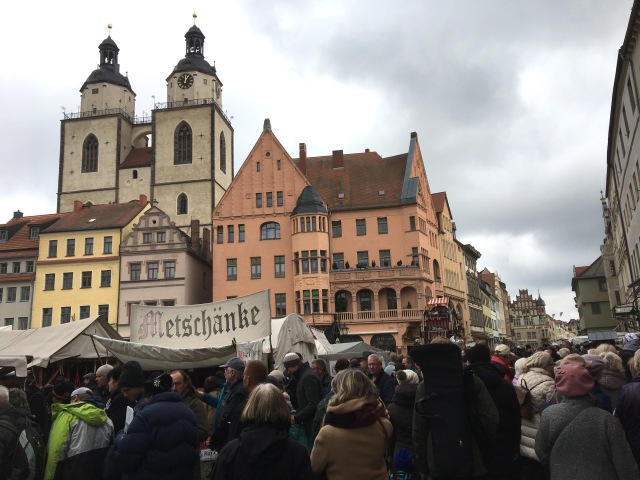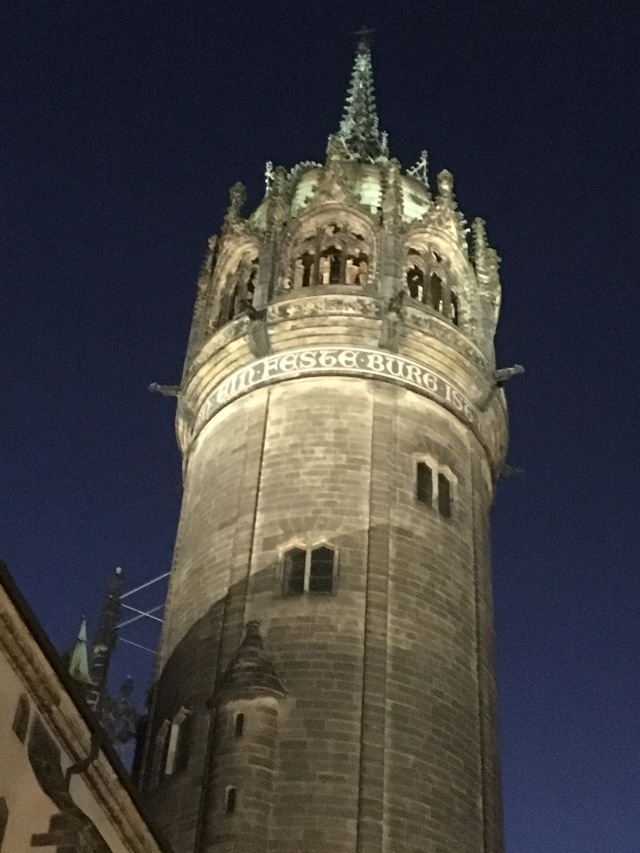Wittenberg, Tuesday, October 31, 2017: The 500th anniversary of the Reformation in this little hamlet that was once the intellectual hub of Saxony and beyond. Reformation Day was a big event (even Angela Merkel made an appearance), and I was there with my bride. My third visit to Lutherstadt. The crowds swelled, especially close to the Schlosskirche and the town square. The day before and after, the town was virtually empty.

How many of the celebrants really knew what the Reformation was all about? Sure, it changed western civilization, gave modern man the Bible in his own language—one that was based on the original tongues, delivered to the Renaissance a swift kick in the derriere, moved toward integrating science and religion and bringing both out of the middle ages (which were, in many ways, still the dark ages), elevated the education levels of children throughout Europe, established biblical scholarship on a new plane, inaugurated critical thinking of the Bible, added to the scientific method, built hospitals, toppled governments, granted individuals their God-ordained dignity, began to produce the wealth of nations, instigated the Protestant work ethic, and increased learning of the arts, science, history, and literature like no other period before or since has ever done.
But what did it ultimately do? It was begun by a lone Augustinian monk, standing up against the world, who articulated that salvation is free, and it comes by faith alone in Christ alone. Simul iustus et peccator (“at the same time, just and a sinner”) was the slogan based on Rom 3.23–24, and it’s still true today. The greatest good that Luther did was to remind us all of God’s grace and the redemption that we find in Christ alone. One lone monk changed the world because he had the courage of his convictions and believed that his God would not deny him. How about we change the world again—just one of us, or more (!)—and remind people of God’s grace, of the sacrifice that his own Son made on our behalf and in our stead, so that by the merit of Christ’s life and death alone—not ours—our eternal life is secured.

The clarion call of the Reformation is as desperately needed today as it ever was, yet after 500 years it has become muddled once again. And many evangelicals nowadays are denying the very roots of the Reformation—the imputation of Christ’s righteousness to our accounts, our Lord suffering God’s wrath in our place on the cross, salvation as a free gift (not based on our works), Scripture as our final authority, the exaltation of Christ.

Sure, Luther got a lot wrong. His hot-headedness got him in trouble often, and many times unnecessarily so. But that same passion is exactly what was needed at the Diet of Worms. However, he also kept Erasmus from joining the ranks of the Reformers in spite of the priest’s own arguments with Rome. He needed a Melanchthon to temper him, to be the quiet, peaceful, intellectual force behind the Reformation. Luther’s worst offense was what he wrote about the Jews in his later years (On the Jews and Their Lies [1543]). It was ugly, un-Christian, hate speech. The Jüdensau is still in the same spot it has occupied for over 700 years—up high in the southeast corner of St. Mary’s Church—the first Protestant church—where Luther preached hundreds of times.
But let us not use Luther’s very flawed nature as an excuse to turn a deaf ear to his gospel proclamation. After all, we stand on the shoulders of giants today, but those giants more often than not had clay feet. And their very failings remind us that, of all the men and women who have ever lived, Christ alone is worthy of all honor.
Will another lone Christ-follower stand up today? Just think what one person can do if fear is not part of their vocabulary!
